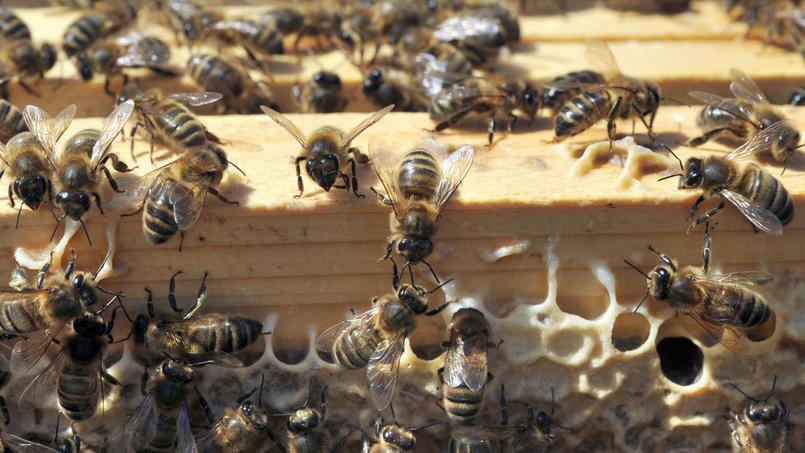
IN FRANCE, The ASSEMBLY VOTE THE PROHIBITION OF INSECTICIDES NEONICOTINOIDS, BEES.
BEES: The ASSEMBLY VOTE THE PROHIBITION OF INSECTICIDES NEONICOTINOIDS
From the newsroom: Le Figaro Newspaper (France)
[Translation Rosane Peruchi - 20|03|2016]
In the context of the second reading for the Assembly on the Biodiversity Bill, the deputies approved an amendment that provides for the prohibition of these pesticides, accused of threatening the survival of bees. But law enforcement has been extended to 1O September 2018.
 We are one step ahead in protecting bees? Through a PS amendment to the “Bill on Biodiversity, accepted at second reading, MEPs voted on Thursday night to ban – no revocation possible – of neonicotinoid insecticides, considered harmful to bees. The application of the ban was, However, postponed to 1O September 2018, so that farmers have time to find alternatives.
We are one step ahead in protecting bees? Through a PS amendment to the “Bill on Biodiversity, accepted at second reading, MEPs voted on Thursday night to ban – no revocation possible – of neonicotinoid insecticides, considered harmful to bees. The application of the ban was, However, postponed to 1O September 2018, so that farmers have time to find alternatives.
After intense debates, that lasted for more than two hours and opposed right-wing deputies and some socialists to the majority, the deputies voted, by 30 votes against 28, the proposal by the chairman of the Commission for Sustainable Development, Jean-Paul Chanteguet (PS). The purpose of this text is “to send a strong signal to chemical groups, to farmers and the executive”, stated. A regulation will offer “concrete answers to farmers, faced with the sudden appearance of a plague that could compromise their crops”. And the list of alternatives to neonicotinoids will be determined based on an opinion from ANSES (French agency for food and health security). “The legislator must assume its responsibilities for prohibiting the use of these molecules, while allowing agricultural professionals to adapt”, claims the author of the measure in his arguments.
PRESSURE OF LOBBIES AND THE EXECUTIVE
The battle was tough. João Paulo Chanteguet denounced “pressures, not only on the part of lobbies agribusiness, but also from the executive ”. In an unusual attitude, Stephane Le Foll sent a letter to deputies on Friday, asking them not to “radical prohibitions” in the French scope, claiming concern, in particular, to avoid the “distortions” competition with other European farmers. The “little surprised” maneuver Ségolène Royal. That's what she explained on Thursday on BFMTV, saying understand the “concern” in defense of farmers, but criticizing “racket battles, notably for the maintenance of pesticides”. Members LR and IDU, some of whom have criticized supporters of a general ban for trying to “seek a symbolic victory, politics, media”, insisted that the measure could “to punish” further French farmers already in crisis.
At the initiative of France, the European Union has restricted some of its uses in 2013, but neonicotinoids are still widely used. However, environmentalists and many socialists argue that hundreds of scientific studies have proven their harmfulness not only to bees and wild pollinators, but also for aquatic and terrestrial invertebrates, the fishes, the birds and, consequently, for the human being. To beyond the “responsibility” with respect to future generations, invoked by several elected officials, including the rapporteur, a socialista Geneviève Gaillard, supporters of the ban stressed that farmers themselves pay the “costs” of these products. These molecules, much more powerful than DDT, “abolished”, have a mechanism similar to that of nicotine, claimed Gérard Bapt (PS), a doctor by profession, asking “who would advise a pregnant woman to smoke”.
300.000 BEEHIVES DESTROYED PER YEAR
“Today there are more than 1100 studies that point against neonicotinoids, so it is necessary to stop with detours and delays. These pesticides kill bees, and we need to ban them”, insists Gilles Lagneau, president of the French National Beekeeping Union (UNAF). Beekeepers' associations have long called for a total ban on these insecticides. According to UNAF, these pesticides would be responsible for the death of 300.000 hives every year. Also called “neonics”, these toxic products affect the nervous system of insects, causing paralysis and then death. They are products with a systemic characteristic, that spread throughout the plant, from sap to pollen. One third of the insecticides sold worldwide are neonics insecticides, which in France are marketed under the names Gaucho and Cruiser.
An amendment by the text draftsman explicitly providing for specific derogations was rejected. Partially satisfied, since she would have preferred the ban to apply from 2017, in the face of a potential change from the majority. Former Minister Delphine Batho, However, tweeted that “the fight is not over”, since the text will return to the Senate before returning to the Assembly.
SOURCE: [LE FIGARO.fr newspaper]
Bees : THE ASSEMBLY VOTE FOR THE BAN ON NEONICOTINOID INSECTICIDES
Source: http://www.lefigaro.fr/sciences/2016/03/18/01008-20160318ARTFIG00061-abeilles-l-assemblee-vote-l-interdiction-des-insecticides-neonicotinoides.php
Updated 18/03/2016 at 10:12 – published in 18/03/2016 at 08:57
Translation: Rosane PERUCHO

Sorry, the comment form is closed at this time.